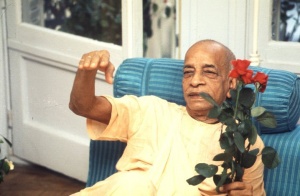SB 11.2 Summary

A.C. Bhaktivedanta Swami Prabhupada
In this chapter Nārada gives instructions in bhāgavata-dharma to the faithful and inquisitive Vasudeva by recounting a conversation between Mahārāja Nimi and the nine Yogendras.
Greatly eager to see Lord Kṛṣṇa, Devarṣi Nārada resided almost exclusively in Dvārakā. Vasudeva, bewildered by the Lord's illusory potency, had previously offered worship to the Supreme Lord Ananta for the purpose of getting a son, but had failed to worship Him for liberation.
Once Nārada arrived at the home of Vasudeva, who worshiped him according to proper etiquette, greeted him respectfully and requested to hear about pure devotional service, which frees one from all kinds of fear. Nārada praised Vasudeva's fixed intelligence and then related the ancient history of the conversation between the nine Yogendras, who were sons of Lord Ṛṣabhadeva, and Nimi, the King of Videha.
Svāyambhuva Manu's son was Priyavrata. His son was Āgnīdhra, whose son was Nābhi. Lord Ṛṣabhadeva, the plenary portion of Vāsudeva, incarnated as the son of Nābhi. The oldest of Ṛṣabhadeva's one hundred sons was Bharata, an exalted devotee of Nārāyaṇa by whose name this earth, previously called Ajanābha-varṣa, became famous as Bhārata-varṣa. Nine other sons of Ṛṣabhadeva were widely known as the nava-yogendras: Kavi, Havir, Antarīkṣa, Prabuddha, Pippalāyana, Āvirhotra, Drumila, Camasa and Karabhājana. They were well versed in knowledge of the self, fixed in their goal and always striving for perfection. Nine other sons of Ṛṣabhadeva took on the duty of kṣatriyas and became masters of the nine dvīpas comprising Bhārata-varṣa. His other eighty-one sons became brāhmaṇas expert in smṛti doctrines who propagated the path of fruitive sacrifice.
The nine Yogendras, free to move without impediment, traveled everywhere as they wished. They were direct associates of the Supreme Personality of Godhead, Madhusūdana, and wandered freely to give protection to the various planets in the universe. The human body can be lost at any moment, but it is still a very rare attainment. Still rarer is to get the association of the confidential devotees of the Lord of Vaikuṇṭha while in this very human body. The association of such saintly persons, even for a fraction of a second, bestows all benefits on a living being. Therefore King Nimi offered the nine Yogendras suitable seats, worshiped them, humbled himself with obeisances and joyfully inquired from them about bhāgavata-dharma. Bhāgavata-dharma, or pure devotional service to the Lord, is the only means of ultimate good fortune for the soul. The Supreme Lord, being pleased by such service, offers His own self to the devotee.
In answer to the King's question, one of the nine Yogendras, Kavi, spoke as follows: "Those means of advancement which are described by the Personality of Godhead Himself and which enable even foolish persons easily to achieve perfect self-realization are called bhāgavata-dharma. This bhāgavata-dharma, manifested as service to the lotus feet of the infallible Supreme Lord, eradicates all fear for the living being. By abiding in bhāgavata-dharma one will never stumble or fall, even while running with both eyes closed. Whatever one does with his body, mind, words, intelligence, consciousness, senses and natural proclivities should all be offered to Lord Nārāyaṇa. Living entities averse to the Lord's lotus feet come under the control of the Lord's illusory energy, māyā. They forget the Lord's identity and are trapped by the illusion of identifying with the temporary body. Under the sway of material attraction, they become greatly fearful. Thus the best thing for them is to surrender their very life energy to a qualified guru and execute worship of the Supreme Lord, the absolute controller of māyā, with pure devotion. Just as by eating one gradually appeases his hunger and with every bite feels more and more satisfied and nourished, a surrendered devotee achieves detachment from all objects other than Kṛṣṇa, gains direct personal experience of the Lord and relishes pure love for the Lord, all simultaneously."
Next Havir spoke, describing the different characteristics of first-class, second-class and third-class devotees: "One who offers prescribed worship with faith to the Deity of Lord Viṣṇu but has no devotion for Vaiṣṇavas and things related to Viṣṇu is a materialistic devotee. One who shows love for the Lord, friendship for the Lord's devotees, mercy for the ignorant and indifference for the enemies of Viṣṇu and the Vaiṣṇavas is an intermediate devotee. And one who sees the presence of the Supreme Lord in everything and sees everything within the Lord is the topmost devotee." The first-class devotees are described in eight verses, which conclude by stating that the first-class devotee keeps the Supreme Lord perpetually fastened to his own heart with ropes of affection. Lord Hari never leaves the heart of such a devotee.